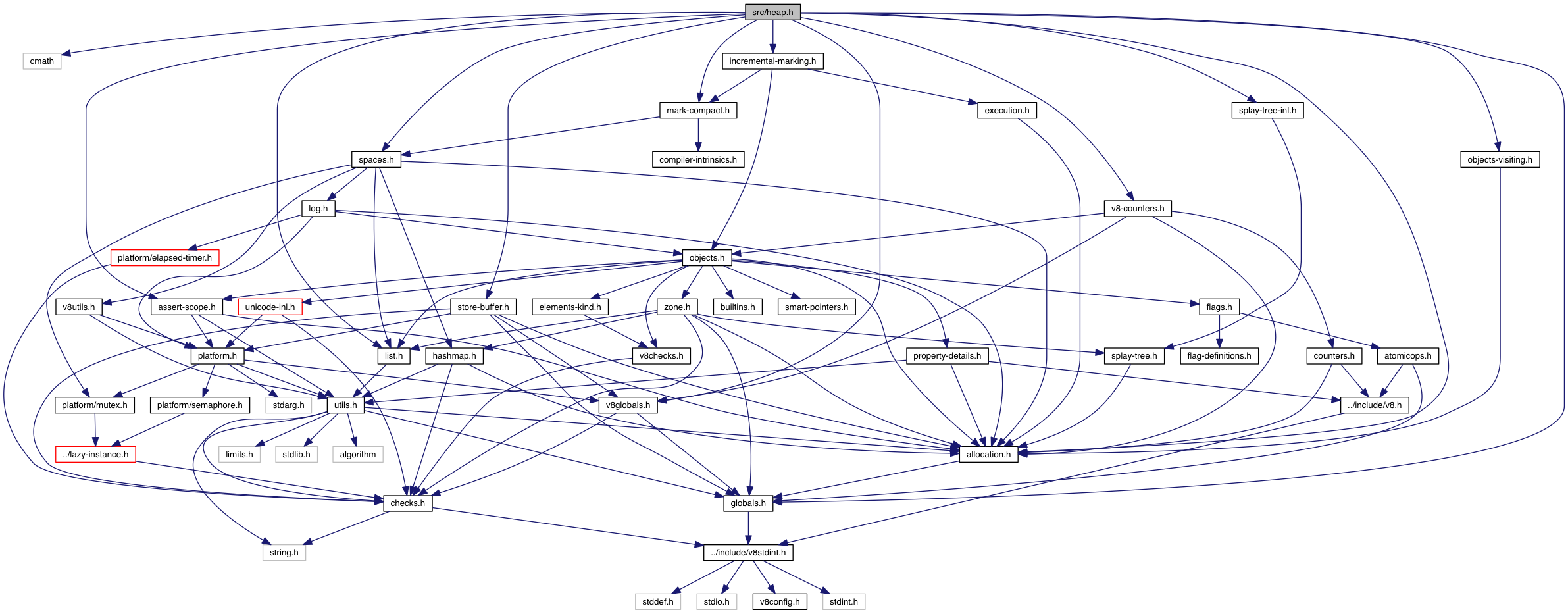 |
v8
3.25.30(node0.11.13)
V8 is Google's open source JavaScript engine
|
 |
v8
3.25.30(node0.11.13)
V8 is Google's open source JavaScript engine
|
#include <cmath>#include "allocation.h"#include "assert-scope.h"#include "globals.h"#include "incremental-marking.h"#include "list.h"#include "mark-compact.h"#include "objects-visiting.h"#include "spaces.h"#include "splay-tree-inl.h"#include "store-buffer.h"#include "v8-counters.h"#include "v8globals.h"

Go to the source code of this file.
Data Structures | |
| class | StoreBufferRebuilder |
| class | PromotionQueue |
| class | ExternalStringTable |
| class | Heap |
| class | Heap::RelocationLock |
| class | HeapStats |
| class | AlwaysAllocateScope |
| class | GCCallbacksScope |
| class | VerifyPointersVisitor |
| class | VerifySmisVisitor |
| class | BASE_EMBEDDED< Visitor > |
| class | BASE_EMBEDDED< Visitor > |
| class | BASE_EMBEDDED< Visitor > |
| class | SpaceIterator |
| class | BASE_EMBEDDED< Visitor > |
| class | KeyedLookupCache |
| class | DescriptorLookupCache |
| class | BASE_EMBEDDED< Visitor > |
| class | BASE_EMBEDDED< Visitor >::BASE_EMBEDDED |
| class | RegExpResultsCache |
| class | WeakObjectRetainer |
| class | IntrusiveMarking |
Namespaces | |
| v8 | |
| v8::internal | |
Macros | |
| #define | STRONG_ROOT_LIST(V) |
| #define | SMI_ROOT_LIST(V) |
| #define | ROOT_LIST(V) |
| #define | IMMORTAL_IMMOVABLE_ROOT_LIST(V) |
| #define | INTERNALIZED_STRING_LIST(V) |
| #define | ROOT_ACCESSOR(type, name, camel_name) |
| #define | STRUCT_MAP_ACCESSOR(NAME, Name, name) |
| #define | STRING_ACCESSOR(name, str) |
| #define | ROOT_INDEX_DECLARATION(type, name, camel_name) k##camel_name##RootIndex, |
| #define | STRING_INDEX_DECLARATION(name, str) k##name##RootIndex, |
| #define | DECLARE_STRUCT_MAP(NAME, Name, name) k##Name##MapRootIndex, |
| #define | ROOT_INDEX_DECLARATION(type, name, camel_name) k##camel_name##RootIndex, |
| #define | ROOT_ACCESSOR(type, name, camel_name) |
Typedefs | |
| typedef String *(* | ExternalStringTableUpdaterCallback )(Heap *heap, Object **pointer) |
| typedef void(* | ScavengingCallback )(Map *map, HeapObject **slot, HeapObject *object) |
Enumerations | |
| enum | ArrayStorageAllocationMode { DONT_INITIALIZE_ARRAY_ELEMENTS, INITIALIZE_ARRAY_ELEMENTS_WITH_HOLE } |
| #define DECLARE_STRUCT_MAP | ( | NAME, | |
| Name, | |||
| name | |||
| ) | k##Name##MapRootIndex, |
| #define ROOT_ACCESSOR | ( | type, | |
| name, | |||
| camel_name | |||
| ) |
| #define ROOT_ACCESSOR | ( | type, | |
| name, | |||
| camel_name | |||
| ) |
| #define ROOT_INDEX_DECLARATION | ( | type, | |
| name, | |||
| camel_name | |||
| ) | k##camel_name##RootIndex, |
| #define ROOT_INDEX_DECLARATION | ( | type, | |
| name, | |||
| camel_name | |||
| ) | k##camel_name##RootIndex, |
| #define ROOT_LIST | ( | V | ) |
| #define SMI_ROOT_LIST | ( | V | ) |
| #define STRING_ACCESSOR | ( | name, | |
| str | |||
| ) |
| #define STRUCT_MAP_ACCESSOR | ( | NAME, | |
| Name, | |||
| name | |||
| ) |